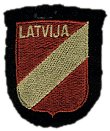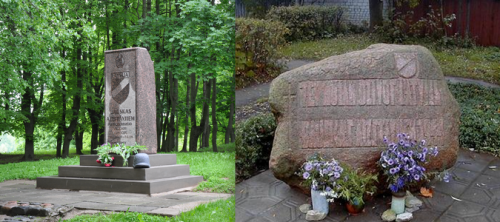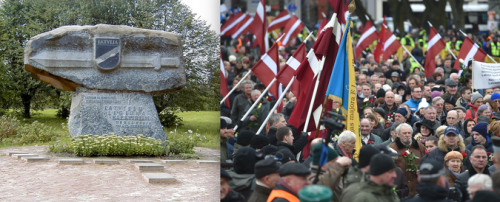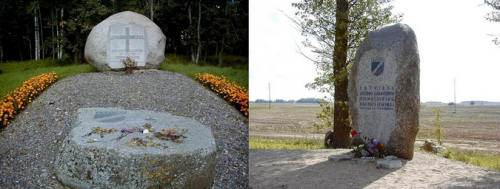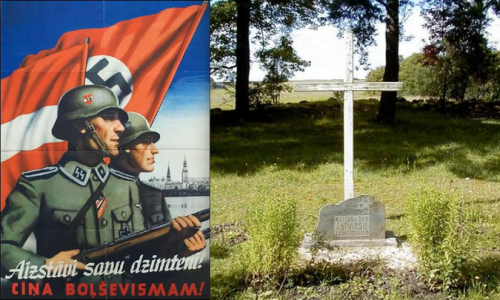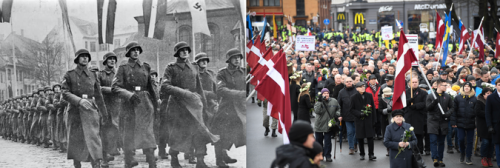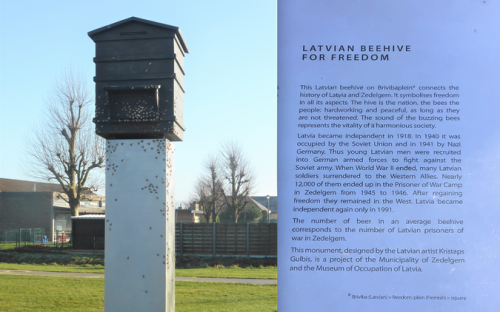The annual Latvian Legion commemoration observation held in Latvia was canceled in 2021 because of the COVID-19 pandemic. In place of our annual review of coverage, we have selected two items in the press to review, this, on alleged Latvian monuments to Nazi collaborators, and another on a Russian report alleging declassified files prove Latvian Nazis worked for the CIA.
Nazi collaborator monuments in LatviaTHE NAZI COLLABORATOR MONUMENT PROJECT
There are hundreds of statues and monuments in the United States and around the world to people who abetted or took part in the murder of Jews and other minorities during the Holocaust. The Forward has, for the first time, documented them in this collection of articles. For a guide to each country’s memorials click here.
Bauska — The Monument to the Defenders of Bauska (below left, unveiled in 2012) honors the Latvian Legion, 1a formation in the Waffen-SS, the military wing of the Nazi party 2responsible for, among other crimes, the Holocaust. The Latvian Legion was composed of two SS divisions: the15th (1st Latvian) and 19th (2nd Latvian).
The obelisk contains the quote “Latvia must be a Latvian state” by Kārlis Ulmanis, the dictator who ruled the country until 1940. Ulmanis 3championed turning Latvia into an ethnically Latvian nation; his dictatorship 4oppressed Jewish media and pushed Jews and other minorities out of public and economic life. Above right, a second SS memorial in Bauska. (Many thanks to Kevin Prenger and Kaj Metz of Traces of War for guidance and images of Bauska, Pienava and Sāti memorials.)
More ["MAW-reh"] — A memorial commemorating the Latvian Legion, which participated in the Battle of More in September 1944. In 2019, the Latvian defense minister delivered a speech on the site, praising the Waffen-SS legion as the “pride of the Latvian nation.” 5Guide brochure here. 6Defending History’s coverage and 7Simon Wiesenthal Center’s condemnation.
Above right, Latvian Legion SS veterans march through Riga, March 16, 2016. (8Thanks to Defending History contributor Aleksandr Kuzmin for information about this and other Latvian memorials.)
Pienava — Two of several monuments to the Latvian Legion located in the area. About 70,000 (three quarters) of Latvia’s Jews were murdered during the Holocaust with the aid of Latvian collaborators.
Sāti — A cross memorial to the fallen Latvian Legionnaires. Above left is a 9Latvian SS recruitment poster with SS insignia over the legion’s.
Below left, the 15th Waffen-SS division (one of the two units composing the Latvian Legion), marches in Riga, 1943. Below right, Latvian Legion SS veterans and relatives in a parade through Riga, 2019.
For a 10monument to the Latvian SS outside of Latvia, see the Belgium section.
For more on Latvia’s parades to actual SS soldiers 11see reports 12in JTA, 13the Jerusalem Post 14and Haaretz, and 15Defending History’s Latvia page.
Author

Lev Golinkin
Lev Golinkin is the author of A Backpack, a Bear, and Eight Crates of Vodka, Amazon’s Debut of the Month, a Barnes & Noble’s Discover Great New Writers program selection, and winner of the Premio Salerno Libro d’Europa. Mr. Golinkin, a graduate of Boston College, came to the US as a child refugee from the eastern Ukrainian city of Kharkov (now called Kharkiv) in 1990. His writing on the Ukraine crisis, Russia, the far right, and immigrant and refugee identity has appeared in The New York Times, Washington Post, Los Angeles Times, CNN, NBC, The Boston Globe, Politico Europe, and Time.com, among others; he has been interviewed by MSNBC, NPR, ABC Radio, WSJ Live and HuffPost Live.
Examination
Golinkin falsely depicts the Latvian Legion as Nazis and Holocaust collaborators.
The Latvian "Waffen (armed) Grenadier (infantry) Divisions der SS (of the SS)", aka Latvian Legion, were unrelated to the Nazi Waffen-SS and had absolutely no association with the Nazi party or Nazism. Their sole role was as combat units on the Eastern Front against Soviet-reinvasion. Even Nazi-hunter Efraim Zuroff attested in a 2012 interview on Latvian television that the Legion had no involvement in the Holocaust. While actual collaborators such as units of Arājs Kommando were joined to the Legion at the end of the war as conditions on the Eastern front deteriorated, no one excuses their earlier collaboration, nor did Legionnaires themselves consider them as comrades; instead they labeled such collaborators as rats [loses effect in translation] and cowards.
The German Waffen-SS were all Nazi party members, had to prove their Germanic purity over multiple past generations, and were actively involve in the Holocaust. This Waffen-SS should not be confused with or equated to the so-called "Latvian Waffen-SS", nor should the "Latvian Waffen-SS" be confused with or equated to similarly-named foreign combat units who were ideologically motivated volunteers.
Until independence, a majority of Latvians supported Bolshevik candidates. Post-independence land reform broke apart Baltic-German mega-manors. Nationalization of certain sectors of the economy was seen as for the benefit of the people. For historical reasons those reforms affected Germans and Jews more than Latvians, but that result should not be mistaken for malign intent. It is reprehensible to suggest as Golinkin unmistakably does here, that Ulmanis championed the purging or total assimilation of non-ethnic-Latvians to create a pure Latvian state. Nothing could be further from the truth.
Latvia was the only European country to outlaw anti-Semitic publications and served as a transit country for Jews fleeing Hitler. Even after Ulmanis dissolved parliament, his official cabinet of advisors included representatives of all minorities, including Jews. Standardization of school instruction in Latvian — curtailing minority education — was not an ethno-nationalistic imposition. Rather, Ulmanis understood that for a country as small as Latvia to progress economically, everyone had to be fluent in the same language, rather than the prevalent cosmopolitan hodgepodge of German, Russian, Latvian, and numerous Latvian dialects. All press, not just Jewish, was subjected to state oversight; there is no dispute that Latvia was an authoritarian state. However, the only newspaper shut down was the one supporting German Nazism. The leader of the (anti-German) Latvian fascists, Gustavs Celmiņš, was imprisoned and ultimately exiled. Indeed, up until the war, Latvia was known among anti-Semites as a "Jewish country" for its positive disposition towards Jews.
Lastly, Golinkin ignores that the invading Soviets nationalized all financial institutions, industrial enterprises, and retail businesses, including Jewish-owned ones.
The brochure provides an objective and accurate recap of war-time conditions in Latvia, of the Legion, and of the battle at More.
Alexander Kuzmins's article begins:
On September 27, Latvia’s minister of defense Dr. Artis Pabriks delivered a speech in More parish commemorating the More battle of September 1944. He chose to say that “Latvian legionnaires are a pride of the Latvian nation and of the state” (Latvijas leģionāri ir latviešu tautas un valsts lepnums) and called them “heroes” (varoņi). The Waffen SS Latvian Legion was a collaborationist Nazi-organized unit, partly volunteer, partly conscripted. Its members swore an oath to Adolf Hitler.
As already mentioned, the Legion did not collaborate in the Holocaust. 80% or more of the Legion was illegally conscripted; it was initially organized from volunteer and conscripted "police" battalions already serving under the Wehrmacht as combat units on the Eastern Front, who had volunteered to ensure that after a year-long brutal occupation, the Soviets never returned — uninvolved in the Holocaust. The Legion "oath" to Hitler was solely to obey military commands specifically in the fight against the (for the Latvians, returning) Bolsheviks. There was no oath to Nazism or to the German cause. Moreover, if someone states an "oath" because that is the only way to arm oneself against Soviet re-invasion, or because it is given under duress, it has no meaning whatsoever. The invocation of the "Hitler oath" is only to slur the Legion. Legionnaires wore their oath, the Latvian flag, under their uniforms, close to their hearts.
"Given the fact that the Legion fought for a victory of the Third Reich, the most genocidal regime in history, and that among those serving in it were active participants in the mass murder of Latvian Jewry, as well as of German and Austrian Jews deported by the Nazis to Riga, such comments are incomprehensible, let alone deeply offensive, coming from a senior minister of a country with full membership in the European Union and NATO."— Efraim Zuroff
Zuroff invokes the false syllogism that the only choice for Latvians was between Soviet victory with its return of brutal subjugation and Nazi victory and the end of Western civilization — and that by fighting against the former, Latvians fought for the latter. Zuroff denies the history that many Legionnaires had personally lived, as enshrined in Legion song, of driving Russians out of their homeland alongside the Germans, and then driving out the Germans to achieve independence. Indeed, Latvians held out in Courland (western Latvia) to the end of WWII as the Red Army suffered 394,000 dead, wounded, or missing attempting to eradicate the last bit of Latvian-held territory. Latvians only wished to restore their independence and be left alone. To suggest independence was not an option, not the goal, not a possibility, denies the path which originally took Latvia to freedom.
Zuroff also ignores his own 2012 statement that the Latvian Legion has no involvement in the Holocaust.
Golinkin presents the poster ("Defend your birthplace in the fight against Bolshevism") as if there was legitimate recruitment and not conscription, as if the poster were a Latvian product and not one of pure Nazi propaganda. The Nazis had already been illegally conscripting Latvians since the start of 1942, half a year into the occupation, and over a year before the Germans organized the Legion.
Golinkin links to more of his misinformed rhetoric, excerpting:
The description of this “Latvian Beehive for Freedom,” erected in 2018, says it “symbolizes freedom in all its aspects,” adding it’s in memory of Latvian prisoners of war who’d been imprisoned in a nearby camp. The sculptor describes it as uniting “the common European values and symbol language understood by all Europeans with something special and visually characteristic only to Latvia.”
What the monument doesn’t contain is symbols of the Waffen-SS, which is who the “beehive for freedom” commemorates. The Latvian prisoners of war were none other than the Latvian Legion, a unit in the Waffen-SS, which was the military wing of the Nazi party responsible for, among other crimes, the Holocaust. Many of the men in the Legion came from local auxiliary police battalions, which assisted the Germans with massacring Jews. Three-quarters of Latvian Jews were murdered in the Holocaust.
Golinkin repeats the outright lie that the Latvian Legion participated in the Holocaust, and that they were part of the "elite wing of the Nazi party," that is the all-members-belonged-to-the-Nazi-Party German SS. The Legionnaires' imprisonment in the Zedelgem POW camp was among their darkest days. Allied guards shot Latvian POWs for live target practice until they were informed the Latvians weren't really Nazis. Zedelgem was also where Legionnaires founded their self-help welfare organization, Daugavas Vanagi (Hawks of the Daugava River). The town of Zedelgem and Latvians have worked together to preserve the history of the camp and of its POWs. Golinkin continues:
The Legion was composed of the 15th Waffen Grenadier (1st Latvian) and the 15th [sic.] Waffen Grenadier (2nd Latvian) divisions in the Waffen-SS. The Anti-Defamation League shows the 15th Division’s insignia as an example of hate signs used by neo-Nazis.
 The 15th Division's insignia
The 15th Division's insigniaThe Latvian Legion 15th Division's insignia was a simple capital "L" with a nested Roman numeral "I", the 19th Division's, the same with the numeral "II". That the Anti-Defamation League describes insignia with no more significance than "Latvian division #1" and "Latvian division #2" as symbols of neo-Nazi anti-Semitic hatred proves how deeply rooted misinformation has become in public discourse among respected rights activists and organizations — who propagate it as fact. Righteous causes demand factual narratives.
In Latvia, hundreds march in honor of SS veterans...The march in Latvia, a member of the NATO alliance and the European Union, is currently the only public event in Europe and beyond honoring people who fought under the banner of SS, Nazi Germany’s elite security force. Occurring amid rising tensions with Russia, it is part of numerous expressions across Eastern Europe of admiration for those, including Holocaust perpetrators, who collaborated with Germany against the Soviet Union.
That the Legion was "under the banner" of the SS is to judge the Legion by a label and not its actions. In no way were Latvians part of Germany's "elite security force." Moreover, the "German cause" was an anathema to Latvians — Latvia was a belligerently occupied country.
The association wtih actual neo-Nazism is utterly false. Indeed, it was only after activists began denouncing the commemoration as a neo-Nazi celebration that some neo-Nazis began to show up — then pointed to as proof of neo-Nazism. Latvian Legion commemoration had been observed for decades without any controversy.
Each year on March 16, a macabre event unfolds on the square around this capital city’s most famous monument. Known as the Memorial for Latvian Legionnaires, it is the world’s only march by veterans of Nazi Germany’s elite SS unit... [A Holocaust commemoration ceremony at Riga’s Freedom Monument is] a new development in a region where growing nationalist extremism features the glorification of Nazi war criminals and downplaying of the Holocaust—often with government support or indifference...Joseph Koren, founder of Latvia Without Fascism, regularly pickets the march along with some 20 protesters who demonstrate even though police won’t give them permission for a counter rally.
Interleaved with reporting on legitimate Holocaust commemoration we find the Russian propaganda Latvians-are-Nazis playbook. Legionnaires were not members of the SS "elite". There is no Latvian extremism glorifying war criminals or downplaying or denying the Holocaust. Lastly, and most significantly, Josef Koren is a (documented) Kremlin-paid agitator and member of Putin's hijacking of the anti-fascist cause, World Without Nazism and head of its Latvian "branch", Latvia Without Nazism — whom British author and documentary producer Christopher Hale naïvely described as a "former bee-keeper."
For the 19th year in a row, about 1,000 people took part in a march commemorating Latvian Legion, who were Nazi collaborators that volunteered with the SS-Waffen brigade during World War II, in the country's capital Riga on Saturday....The Legion denies it was involved in any Jewish massacres during the Holocaust, however, this claim is contrary to evidence that has been found....Last year, Latvia Without Fascism, who were barred from holding a counterprotest said the fact this event was taking place in Europe today "was a disgrace."...In 2012, the Council of Europe’s Commission against Racism and Intolerance published its report on Latvia (fourth monitoring cycle), in which it condemned commemorations of persons who fought in the Waffen SS and collaborated with the Nazis.
Once again the Legion are falsely portrayed as Holocaust collaborators. There is no "evidence to the contrary" which has been found. No one while in service of the Legion has ever been accused of a war crime. (Collaborators "joined" late in the war to fight on the front, who collaborated in the Holocaust prior, were tried and convicted in German and Soviet courts after the war.) Putin's "anti-fascist" propaganda organization is once again featured as a legitimate anti-Nazi movement.
Excerpting from the lengthy ECRI report:
Further, the former [Latvian] Minister of Foreign Affairs did not condemn the march, stating, on the contrary, that there was nothing wrong with former soldiers gathering together privately to remember their fallen comrades-in-arms and that any attempt to characterise this commemoration as the glorification of Nazism is unacceptable. ECRI understands that part of Latvian public opinion considers that: the legion did not fight for Nazism but to restore Latvian sovereignty (further to Soviet occupation); they did not commit atrocities against Jews; and that, although many individuals joined the legion willingly, many others were conscripted. However, ECRI cannot but express concern about any attempt to justify fighting in the Waffen SS and collaborating with the Nazis, as it risks fuelling racism, xenophobia, antisemitism and intolerance.
Regrettably, ECRI devolves to employ the technique of Kremlin propagandists, that is, to reduce fact to opinion held by some of the public — no more or less legitimate than any other "opinion." Latvians just wish to commemorate those who fought and died with a Latvian flag next to their heart hoping for a restored Latvia after the war, regardless of how they came to serve in the Latvian Legion. The politicization of the commemoration is all about the agendas of the political hacks, propagandists, and activist (legitimate and posturing) protagonists, swirling like vultures around the commemoration, caring only about its portrayal, not its substance.
Other than the provocative lead:
1,000 Veterans March in Latvia to Commemorate Nazi SS Soldiers
Veterans of Latvia's World War II-era Waffen SS wing and their supporters marched through the capital Riga on Saturday in a controversial demonstration to commemorate their fallen comrades.
and its characterization of the Legion as "Nazi SS", the article represents circumstances evenhandedly.
From the article appearing atop at this moment (April 11, 2021):
Roland Binet, a Belgian composer working out of De Panne, has just released on Youtube a new video comprising his musical composition to a series of photographs by his wife Francine Binet taken during their joint visit to Riga in 2012, the Latvian capital, to monitor that year’s far-right March 16th parade. The annual marches glorify the Waffen SS, which fought for the Nazis and whose members all swore the oath of loyalty to Adolf Hitler. Mr. Binet is a veteran contributor to Defending History. His most recent and for many, quite startling piece, divulges the hard-to-believe erection of a monument to the Latvian Waffen SS in a town in Belgium.
We have already addressed glorification, fighting "for" the Nazis, the oath, etc. We dealt with Belgium, Zedelgem, above. Like many other critics, Binet in his (linked to) article conflates the Latvian Legion with foreign Waffen-SS formations such as the Flemish who were volunteers, not conscripts, and who supported the Nazi new world order, and then associates the attempts to rehabilitate Belgians who did fight for the Nazi cause with defense of the Legion, which fought only against Soviet re-invasion.
